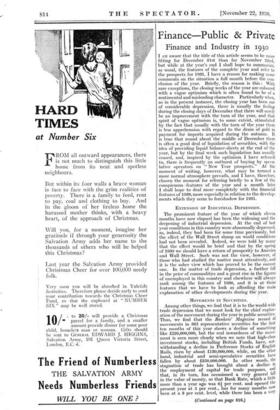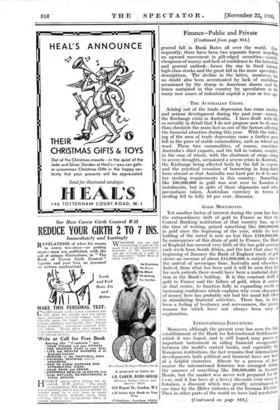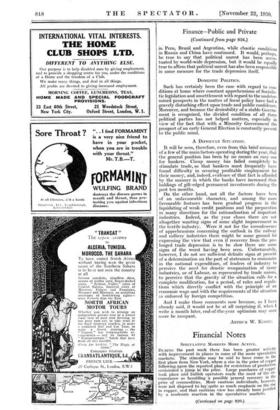Finance—Public & Private
Finance and Industry in 1930
I AM aware that the title of this article seems to be more fitting for December 31st than for November 22nd, but while at the year's end I shall hope to summarize, as usual, the features of the complete year and refer to the prospects for 1931, I have a reason for making some comments on the situation a full month before the con- clusion of the year. Briefly, the reason is this : With rare exceptions, the closing weeks of the year are coloured with a vague optimism which is often found to be of a sentimental and misleading character. Particularly when, as in the present instance, the closing year has been one of considerable depression, there is usually the feeling during the closing days of December that there will surely be an improvement with the turn of the year, and that spirit of vague optimism is, to some extent, stimulated by the fact that usually with the turn of the year there is less apprehension with regard to the drain of gold in payment for imports acquired during the autumn. It is true that round about the middle of December there is often a good deal of liquidation of securities, with the idea of providing liquid balance-sheets at the end of the year, but by the final week such liquidation has usually ceased, and, inspired by the optimism I have referred to, there is frequently an outburst of buying by specu- lative operators on New Year prospects." At the moment of writing, however, what may be termed a more normal atmosphere prevails, and I have, therefore, chosen the moment for reTerring briefly to a few of the conspicuous features of the year and a month later I shall hope to deal more completely with the financial features .of 1930, more especially in relation to the develop- ments which they seem to foreshadow for 1981.
EXTENSION OF INDUSTRIAL DEPRESSION.
The prominent feature of the year of which eleven months have now elapsed has been the widening and the deepening of industrial depression. At the end of last year conditions in this country were abnormally depressed, as, indeed, they had been for some time previously, but the effect of the Wall Street slump on world conditions had not been revealed. Indeed, we were told by many that the effect would be brief and that by the spring of 1930 we should have a return of prosperity to America and Wall Street. Such was not .the view,- however, of those who, had studied the matter most attentively, and it is the sober view ,which has proved to be the correot one. In the matter of trade depression, a further fall in the price of commodities and a great rise in the_figures of unemployed in this country and elsevihere will always rank among the iVatures of 1930, and it is at' those features that we hive to look as affording the -main explanation of other developments during the year.
MOVEMENTS IN SECURITIES.
Among other things, we fmd that it is to the world-wide trade depression that we must look for the chief explan- ation of the movement during the year in public securities. Thus, we find that the Bankers' Magazine record of movements in 865 representative securities for the first ten months of this year shows a- decline of something like £220,000,000, but the real inwardness of the move- ment is seen more clearly when we note that high-class investment stocks, including British Funds, have, not- withstanding a decline in Preference Stocks of English Rails, risen by about £130,000,000, while, on the other hand, industrial and semirspeculative securities have fallen by about £850,000,000. In other words, the stagnation of trade has brought about a decline in the employment of, capital for trade purposes, and that, in its turn, has occasioned a very general fan in the value of money, so that Bank Rate, which a little more than a year ago was 61 per cent. and opened the present year at 5 per cent., has for many months now been at a 8 per cent. level, while there has been a very (Continued on page 816.) Finance—Public and Private
(Continued front page 814.)
general fall in Bank Rates all over the world, con. sequently; there have been two separate forces impelling an upward movement in gilt-edged securities—namely, cheapness of money and lack of confidence in the industrial and general outlook—hence the rise in fixed interest high-class stoeks and the great fall in the more speculatity descriptions. The decline in the latter, moreover, has no doubt also been accentuated by lack of confidence occasioned -by by the slump in American shares and the losses sustained in this country by speculators in the many new issues of industrial capital a year or two ago, THE AUSTRALIAN CRISIS.
Arising out of the trade depression has come another and serious development during the past year—namely, the Exchange crisis in Australia. I have dealt with this so recently in detail that I do not propose now to do more than chronicle the main fact as one of the factors affecting the financial situation during this year. With the widen. ing of the area of trade depression came a further great fall in the price of stable commodities, such as wheat and wool. These two commodities, of course, constitute Australia's chief exports, and the fall in values, coupled, in the case of wheat, with the shortness'-of crops owing to severe droughts, occasioned a severe crisis in Australia, the Exchange being affected both by the fall in exports and the practical' cessation of bOrrowing in long-dated form abroad so that Australia was hard put to it to meet her sterling requirements in this country. Something like £30,000,000 in gold was sent over to London in instalments, but in spite of those shipments and other precautions taken, Australian currency in terms of sterling fell to fully 10 per cent. discount.
GOLD MOVEMENTS.
Yet another factor of interest during the year has been the extraordinary- drift of gold to France so that the Central Banking institution of that country has, up to the time of writing, gained something like £80,000,000 in gold since the beginning of the year, while its total holding of the metal is now no less than £410,000,000. In consequence of this drain of gold to France, the Bank of England has secured very little of the bar gold arriving each week from South. Africa, and the fact that since the beginning of January the Bank of England stock of gold shows an increase of about.114,000,000 is entirely due to the arrival of sovereigns from Australia and elsewhere. Indeed, from what has been said it will be seen that but for such arrivals there would have been a material deple- tion in the Bank's holding. It is this constant drift of gold to France and the failure of gold, when it arrives at that centre, to function fully in expanding credit or increasing confidence which explains why even cheapness of money here has probably not had the usual full effect in stimulating financial activities. There has, in fact been a feeling of hesitancy and nervousness, the precise reasons for which have not always been easy 01 explanation.
INTERNATIONAL INFLUENCES.
. .
Moreover„although the present year has seen the fins establishment of the Bank for International Settlements, which it was hoped, and is still hoped, may prove an important instrument in aiding financial co-operation between. -the world's central banks, and especially the European institutions, the fact remains that international developments both political-,and financial have not been of a helliful character. Ahnost by a process of forte inajeur the • international flotation was arranged during the summer of something like £80,000,000 in German Bonds, but the market. was never well prepared for the izsle, and it has been at a heavy discount ever since its flotation, a discount which was greatly accentuated of one time by the Hitler victories at the German Election. Then in other parts of the world we have had revolution'
(Continua .au-.page 818)
Finance—Public and Private
(Continued from page 816.)
in Peru, Brazil and Argentina, while chaotic conditions in Russia and China have continued. It would, perhaps, be true to say that political unrest has been accen- tuated by world-wide depression, but it would be equally true to affirm that political unrest has also been responsible in some measure for the trade depression itself.
DOMESTIC POLITICS.
Such has certainly been the case with regard to con. ditions at home where constant apprehensions of Socialis- tic legislation and unsettlement with regard to the undeter- mined prospects in the matter of fiscal policy have had a gravely disturbing effect upon trade and public confidence. Moreover, and because the desirability of a stable Govern- ment is recognized, the divided condition of all three political parties has not helped matters, especially in view of the fact that with a Minority Government the prospect of an early General Election is constantly present to the public mind.
A DIFFICULT SITUATION.
It will be seen, therefore, even from this brief summary of a few of the main factors operating during the year, that the general position has been by no means an easy one for bankers. Cheap money has failed completely to stimulate trade, so that bankers must frequently have found difficulty in securing profitable employment for their money, and, indeed, evidence of that fact is afforded by the manner in which the banks have increased their holdings of gilt-edged permanent investments during the past ten months.
On the other hand, not all the factors have been of an unfavourable character, and among the more favourable features has been gradual progress in the liquidating of weak credit positions and the preparation in many directions for the rationalization of important industries. Indeed, as the year closes there are not altogether wanting signs of some slight improvement in the textile industry. Were it not for the recrudescence of apprehensions concerning the outlook in the railway and colliery industries there might be some ground for expressing the view that even if recovery from the pro- longed trade depression is to. be slow there are some signs of the worst having been seen. Unfortunately, however, I do not see sufficient definite signs at present of a determination on the part of statesmen to economize in the national expenditure, ,of leaders of industry to perceive the need for drastic reorganization of many industries, or of Labour, as represented by trade unions, to perceive that the gravity of the situation calls for a complete modification, for a period, of rules and regula- tions which directly conflict with the principle of an economic wage and with the requirements of the situation as enforced by foreign competition.
And I make those comments now because, as I have already said, it would not be at all surprising if, when I write a month later, end-of-the-year optimism may once more be rampant.
ARTHUR W. KIDDY.




















































































 Previous page
Previous page